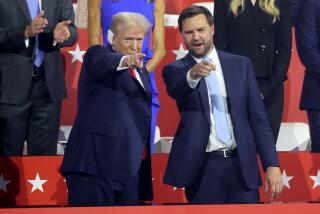In Egypt, Reforms Are All Talk and Little Substance
- Share via
CAIRO — A ruling party official stood before a throng of journalists this week and dangled tantalizing ideas: Opposition parties would grow strong, Egyptian youth would become involved and every kind of political reform would be up for discussion, including amending the constitution.
“The era of one-party rule is over,” said Mohammed Kamal, nodding studiously over a vast bouquet of microphones as the ruling National Democratic Party kicked off its annual conference. “Egypt welcomes any initiatives for reform. All the doors are open.”
Then an Egyptian reporter stood up to ask her question: Would President Hosni Mubarak run for a fifth straight term?
A murmur rippled through the room. Mubarak has held on to his presidency with sheer muscle for 23 years -- and appears set to run yet again as the lone candidate in a presidential referendum in which the choice is either “yes” or “no.”
Kamal frowned a little and scratched his hands.
“This is not discussed. We are not going to discuss it in this conference,” he said curtly.
Cries went up from the reporters:
“The party is silent on these matters! Why? The referendum is next year!”
“The party works according to certain directives and orders,” Kamal said. “This was not part of our directive to discuss. It won’t be discussed.”
So goes democracy in Egypt, where the only news at this year’s much publicized, heavily guarded conference seems to be that nothing much has changed since last year. Despite the Bush administration’s aggressive talk of spreading democracy in the Middle East, rulers here in the Arab world’s center of intellectual thought seemed untroubled this week by pressure to win democratic legitimacy among millions of impoverished Egyptians.
The conference was another bitter disappointment for Egypt’s struggling opposition parties, democracy activists and even some liberal members of the ruling party. They had hoped that the party might use the gathering to loosen some restrictions, such as amending the constitution to limit the president’s term or abolishing the emergency law that has smothered Egypt’s civil society for more than two decades. At the very least, activists reasoned, these questions might come up for public discussion.
But they didn’t.
“We have a mirage of democracy,” said Rifaat Said, head of the opposition Tagammu Party.
Instead, thousands of delegates gathered in a conference center -- a building inaugurated by Iraqi President Saddam Hussein in 1989 that is set amid rolling lawns and topiary -- and spent most of their time congratulating themselves on “reform” and talking about the economy. In between, they toasted the rising star of Gamal Mubarak, the president’s son and rumored successor.
It was the younger Mubarak, fresh-faced and dapper in navy suits and neat ties, who emerged as the dominant face at the microphone. A former investment banker, the 41-year-old has been publicly groomed in recent years for leadership.
Although he has indignantly rejected the idea of inheriting his father’s office, Mubarak has said that he wouldn’t necessarily turn down a nomination from the ruling party. Most Egyptian pundits and party insiders are still betting that the elder Mubarak will run once again as the sole candidate in next fall’s presidential referendum, and the usual wash of campaign propaganda is expected to begin soon.
Despite his failing health and a recent hospitalization, the 76-year-old Mubarak has remained visibly active. But in the meantime, his son has increasingly represented the Egyptian government at international meetings around Cairo.
“He plays a very important role now, but it’s not for the party or the people -- it’s for himself to be in power,” said Essam Eryan, an official with the Muslim Brotherhood, an Islamist opposition movement. “All the media in any Arab country will focus on one person -- the ruler. If you follow the media in Egypt, the focus is on whom? He [Gamal] is the leader.”
When Gamal Mubarak called a news conference Thursday, he talked effusively and vaguely about economic reform -- Egypt is overhauling the tax and customs systems. Asked about the candidacy for president, the ruler’s son simply echoed the party line: That question wasn’t on the agenda.
The party did announce a few political changes, but they were mostly minor revisions to existing laws. A new elections committee was created to oversee next year’s parliamentary polls and presidential referendum, and the party altered the rules to make it marginally easier to set up an opposition party.
“They think constitutional reforms are a luxury at this time, and kind of divisive,” said Abdel Moneim Said, a ruling party member who had pushed for a deeper political overhaul. “These are quantitative steps, expanding what already exists. There is no qualitative change.”
But when Hosni Mubarak finally emerged to speak to the delegates Thursday night, the mood in the auditorium was reverential. Without giving specifics, the president pledged to “spread the culture of democracy and the culture of dialogue and of accepting differences.”
The delegates stood up, supposedly too overcome by emotion to keep silent, and interrupted the president, shouting their adulation.
“It’s poetry!” one man yelled. “Mubarak, take us with you!”
“You are a titan to Egypt!” another yelled.
Mubarak smiled with closed lips. “This guy stayed up all night preparing this,” he said about the supporter. “So he’s got a right to say it.”
More to Read
Sign up for Essential California
The most important California stories and recommendations in your inbox every morning.
You may occasionally receive promotional content from the Los Angeles Times.













